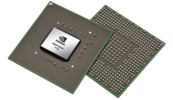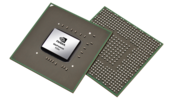NVIDIA GeForce 910M vs NVIDIA GeForce 920M vs NVIDIA GeForce 930MX
NVIDIA GeForce 910M
► remove from comparison
The NVIDIA GeForce 910M is an entry-level DirectX 12 compatible graphics card announced in late 2015. Its core is based on the 28nm GF117 chip (Fermi architecture) and is equipped with 64-bit DDR3 memory. The 910M is a renamed GeForce 820M, which already was based on the the old GT 620M, GT 720M and GeForce 710M.
Architecture
The GF117 is based on the optimized GF108 Fermi chip (GeForce GT 540M) and offers 96 shaders, 16 TMUs and 4 ROPs. Each shader core is clocked twice as fast as the rest of the graphics chip, a technique known as hot clocking. More detailed information on Fermi can be found on the GT 435M GPU page.
It should be noted that the GF117 does not offer dedicated graphic ports and can therefore only be used in conjunction with Optimus.
The 820M supports GPU Boost 2.0, which can automatically overclock the card if the laptop cooling system allows it.
Performance
The gaming performance should be identical to the old GeForce 820M (see this page for benchmarks and game tests) and therefore also GT 720M and the Intel Iris Graphics 5100. This places the card in the entry level segment. Only old or low demanding games run fluent on this graphics card.
Features
The shader cores (also called CUDA cores) can be used for general calculations with APIs such as CUDA, DirectCompute 2.1 and OpenCL. PhysX is theoretically possible, but the 910M is too slow to handle both PhysX and 3D rendering in modern games. 3D Vision is not supported according to Nvidia.
Power consumption
The power consumption of the Geforce 910M should be similar to the old 820M and GT 720M. As a result, the GPU is best suited for notebooks 13 inches in size or greater. The efficiency however cant be compared to a modern Maxwell based GPU like the GeForce 920MX.
NVIDIA GeForce 920M
► remove from comparison
The NVIDIA GeForce 920M (sometimes also NVIDIA GeForce GT 920M) is an entry level DirectX 12 graphics card. It is based on the 28 nm Kepler architecture and uses the same GK208 chip as the GeForce GT 730M, 825M and 740M. The 384 shaders are clocked at 954 MHz, while the memory (64-bit DDR3 interface) runs at 900 MHz (1800 MHz effective).
Architecture
GK208 is based on the Kepler architecture and offers two shader blocks, called SMX, each with 192 shaders for a total of 384 shader cores. The shaders are clocked at the same speed as the rest of the chip. Furthermore, the GK208 chip has 16 TMUs and 8 ROPs on a 64-bit memory interface.
PCIe 3.0 is now supported by the mobile Kepler series and GPU Boost 2.0 mode can automatically overclock the card if the laptop cooling system allows it. This feature is available on any notebook with a graphics card from the 800M series.
Performance
The GeForce 920M offers a performance similar to the AMD Radeon R7 M260 or R7 M360 and will handle modern games (as of 2014/2015) in low settings only. For comparison, a GeForce 930M is about 20 to 30 percent faster than the 920M.
Features
The feature set of the 920M corresponds to the GT 730M and 825M. This includes support for up to 4 active displays. Furthermore, high resolution monitors of up to 3840x2160 pixels can now be connected using DisplayPort 1.2 or HDMI 1.4a if available. HD-Audio codecs, such as Dolby TrueHD and DTS-HD, can be transmitted via bitstream mode through the HDMI port. However, as most laptops will feature Optimus, the integrated GPU will likely have direct control over the display ports and may limit the feature set available by the Nvidia Kepler cards.
The 5th generation PureVideo HD video processor (VP5) offers hardware decoding of HD videos. Common codecs such as MPEG-1/2, MPEG-4 ASP, H.264 and VC1/WMV9 are fully supported up to 4K resolutions while VC1 and MPEG-4 are supported up to 1080p. Two streams can be decoded in parallel for features such as Picture-in-Picture. Another feature is the inclusion of a dedicated video encoding engine similar to Intel QuickSync that can be accessed via the NVENCI API.
Power Consumption
The power consumption of the GeForce 920M is similar to the 825M and suited for 13-inch laptops and above.
NVIDIA GeForce 930MX
► remove from comparison
The Nvidia GeForce 930MX is an entry-level DirectX 12 graphics card for laptops that was announced in the first quarter of 2016. It is the refresh of the GeForce 930M and now supports GDDR5 graphics memory. It is based on the same GM108 chip and may feature slightly increased clock rates.
The performance will depend on the used graphics memory. With fast GDDR5 it should be similar or slightly faster than the Maxwell GPU in the Surface Book. With DDR3 it performs be somewhere between the old 930M and 940M. That means that only non demanding games of 2017 run fluently (in lowest detail settings) on the GeForce 930M. Games with low demands like Dota 2 or Path of Exile should run in higher detail settings and resolution.
The power consumption should be quite similar to the 930M and 940M and therefore also suited for smaller laptops.
| NVIDIA GeForce 910M | NVIDIA GeForce 920M | NVIDIA GeForce 930MX | ||||||||||||||||||||||||||||||||||||||||||||||||||||||||||||||||||||||||||||||||||
| GeForce 900M Series |
|
|
| |||||||||||||||||||||||||||||||||||||||||||||||||||||||||||||||||||||||||||||||||
| Codename | N15V-GM | N16V-GM-S | N16S-GMR | |||||||||||||||||||||||||||||||||||||||||||||||||||||||||||||||||||||||||||||||||
| Architecture | Kepler | Kepler | Maxwell | |||||||||||||||||||||||||||||||||||||||||||||||||||||||||||||||||||||||||||||||||
| Pipelines | 384 - unified | 384 - unified | 384 - unified | |||||||||||||||||||||||||||||||||||||||||||||||||||||||||||||||||||||||||||||||||
| Core Speed | 641 MHz | 954 MHz | 952 - 1020 (Boost) MHz | |||||||||||||||||||||||||||||||||||||||||||||||||||||||||||||||||||||||||||||||||
| Memory Speed | 2000 MHz | 1800 MHz | 2000 MHz | |||||||||||||||||||||||||||||||||||||||||||||||||||||||||||||||||||||||||||||||||
| Memory Bus Width | 64 Bit | 64 Bit | 64 Bit | |||||||||||||||||||||||||||||||||||||||||||||||||||||||||||||||||||||||||||||||||
| Memory Type | DDR3 | DDR3 | GDDR5, DDR3 | |||||||||||||||||||||||||||||||||||||||||||||||||||||||||||||||||||||||||||||||||
| Max. Amount of Memory | 2048 MB | 4 GB | ||||||||||||||||||||||||||||||||||||||||||||||||||||||||||||||||||||||||||||||||||
| Shared Memory | no | no | no | |||||||||||||||||||||||||||||||||||||||||||||||||||||||||||||||||||||||||||||||||
| API | DirectX 12 (FL 11_0), Shader 5.0 | DirectX 12 (FL 11_0), Shader 5.0, OpenGL 4.5 | DirectX 12 (FL 11_0), Shader 5.0, OpenGL 4.5 | |||||||||||||||||||||||||||||||||||||||||||||||||||||||||||||||||||||||||||||||||
| Power Consumption | 15 Watt | 15-25 Watt | ||||||||||||||||||||||||||||||||||||||||||||||||||||||||||||||||||||||||||||||||||
| Transistors | 900 Million | 1.3 Billion | ||||||||||||||||||||||||||||||||||||||||||||||||||||||||||||||||||||||||||||||||||
| technology | 28 nm | 28 nm | 28 nm | |||||||||||||||||||||||||||||||||||||||||||||||||||||||||||||||||||||||||||||||||
| Features | PhysX, Verde Drivers, CUDA, Play, Optimus, GPU Boost 2.0 | Optimus, PhysX, Verde Drivers, CUDA, 3D Vision, 3DTV Play, GPU Boost 2.0 | GPU Boost 2.0, Optimus, PhysX, CUDA, GeForce Experience | |||||||||||||||||||||||||||||||||||||||||||||||||||||||||||||||||||||||||||||||||
| Date of Announcement | 01.09.2015 | 27.01.2015 | 10.03.2016 | |||||||||||||||||||||||||||||||||||||||||||||||||||||||||||||||||||||||||||||||||
| Link to Manufacturer Page | www.geforce.com | www.geforce.com |
Benchmarks
3DM Vant. Perf. total + NVIDIA GeForce 910M
specvp11 snx-01 + NVIDIA GeForce 920M
specvp12 sw-03 + NVIDIA GeForce 930MX
Cinebench R15 OpenGL 64 Bit + NVIDIA GeForce 910M
GFXBench T-Rex HD Offscreen C24Z16 + NVIDIA GeForce 910M
Average Benchmarks NVIDIA GeForce 910M → 100% n=22
Average Benchmarks NVIDIA GeForce 920M → 154% n=22
Average Benchmarks NVIDIA GeForce 930MX → 194% n=22
* Smaller numbers mean a higher performance
1 This benchmark is not used for the average calculation
Game Benchmarks
The following benchmarks stem from our benchmarks of review laptops. The performance depends on the used graphics memory, clock rate, processor, system settings, drivers, and operating systems. So the results don't have to be representative for all laptops with this GPU. For detailed information on the benchmark results, click on the fps number.

The Witcher 3 v4
2023
High On Life
2023
The Quarry
2022
F1 22
2022
Vampire Bloodhunt
2022
Ghostwire Tokyo
2022
Cyberpunk 2077 1.6
2022
GRID Legends
2022
Dying Light 2
2022
Farming Simulator 22
2021
Forza Horizon 5
2021
Riders Republic
2021
Back 4 Blood
2021
F1 2021
2021
Outriders
2021
Cyberpunk 2077 1.0
2020
Yakuza Like a Dragon
2020
Watch Dogs Legion
2020
Star Wars Squadrons
2020
Serious Sam 4
2020
Crysis Remastered
2020
Horizon Zero Dawn
2020
Death Stranding
2020
F1 2020
2020
Gears Tactics
2020
Doom Eternal
2020
Hunt Showdown
2020
Escape from Tarkov
2020
Need for Speed Heat
2019
FIFA 20
2019
Borderlands 3
2019
F1 2019
2019
League of Legends
2019
The Division 2
2019
Dirt Rally 2.0
2019
Far Cry New Dawn
2019
Metro Exodus
2019
Apex Legends
2019
Just Cause 4
2018
Darksiders III
2018
Battlefield V
2018
Farming Simulator 19
2018
Fallout 76
2018
Hitman 2
2018
Forza Horizon 4
2018
Monster Hunter World
2018
The Crew 2
2018
Far Cry 5
2018
X-Plane 11.11
2018
Fortnite
2018
Call of Duty WWII
2017
Destiny 2
2017
ELEX
2017
The Evil Within 2
2017
FIFA 18
2017
Ark Survival Evolved
2017
F1 2017
2017
Team Fortress 2
2017
Rocket League
2017
Prey
2017
For Honor
2017
Resident Evil 7
2017
Dishonored 2
2016
Titanfall 2
2016
Farming Simulator 17
2016
Battlefield 1
2016
Civilization 6
2016
No Man's Sky
2016
Overwatch
2016
Doom
2016
Need for Speed 2016
2016
Hitman 2016
2016
The Division
2016
Far Cry Primal
2016
XCOM 2
2016
Rainbow Six Siege
2015
Just Cause 3
2015
Fallout 4
2015
Anno 2205
2015
FIFA 16
2015
World of Warships
2015
Metal Gear Solid V
2015
Dota 2 Reborn
2015
The Witcher 3
2015
Dirt Rally
2015
GTA V
2015
Battlefield Hardline
2015
Evolve
2015
The Crew
2014
Far Cry 4
2014
F1 2014
2014
The Evil Within
2014
Ryse: Son of Rome
2014
Alien: Isolation
2014
Fifa 15
2014
Sims 4
2014
Risen 3: Titan Lords
2014
GRID: Autosport
2014
Watch Dogs
2014
Thief
2014
Battlefield 4
2013
Total War: Rome II
2013
Company of Heroes 2
2013
Metro: Last Light
2013
BioShock Infinite
2013
Tomb Raider
2013
Hitman: Absolution
2012
Counter-Strike: GO
2012
Diablo III
2012
Batman: Arkham City
2011
Mafia 2
2010
StarCraft 2
2010Average Gaming NVIDIA GeForce 910M → 100%
Average Gaming 30-70 fps → 100%
Average Gaming NVIDIA GeForce 920M → 153%
Average Gaming 30-70 fps → 185%
Average Gaming NVIDIA GeForce 930MX → 225%
Average Gaming 30-70 fps → 216%
| NVIDIA GeForce 910M | NVIDIA GeForce 920M | NVIDIA GeForce 930MX | |||||||||||||||||||
|---|---|---|---|---|---|---|---|---|---|---|---|---|---|---|---|---|---|---|---|---|---|
| low | med. | high | ultra | QHD | 4K | low | med. | high | ultra | QHD | 4K | low | med. | high | ultra | QHD | 4K | ||||
| The Witcher 3 v4 | 6.73 | ||||||||||||||||||||
| High On Life | 12.3 | ||||||||||||||||||||
| Spider-Man Miles Morales | 8.91 | 7.86 | |||||||||||||||||||
| A Plague Tale Requiem | 6.54 | ||||||||||||||||||||
| The Quarry | 9.93 | ||||||||||||||||||||
| F1 22 | 18.2 | 15.7 | 10.8 | 7.17 | |||||||||||||||||
| Vampire Bloodhunt | 26.5 | 16.5 | 15.6 | ||||||||||||||||||
| Ghostwire Tokyo | 11.1 | ||||||||||||||||||||
| Tiny Tina's Wonderlands | 13.1 | 8.8 | |||||||||||||||||||
| Cyberpunk 2077 1.6 | 7.6 | ||||||||||||||||||||
| Elex 2 | 9.03 | ||||||||||||||||||||
| GRID Legends | 25.1 | 16.6 | |||||||||||||||||||
| Dying Light 2 | 6.27 | ||||||||||||||||||||
| Rainbow Six Extraction | 12 | ||||||||||||||||||||
| Farming Simulator 22 | 46.2 | 17.7 | |||||||||||||||||||
| Forza Horizon 5 | 29 | 12 | |||||||||||||||||||
| Riders Republic | 23 | 10 | |||||||||||||||||||
| Back 4 Blood | 46 | 16.7 | 11.6 | ||||||||||||||||||
| Far Cry 6 | 18.3 | ||||||||||||||||||||
| New World | 17.8 | ||||||||||||||||||||
| F1 2021 | 46.1 | 20.3 | 15.1 | ||||||||||||||||||
| Monster Hunter Stories 2 | 45.4 | 25.9 | 22.2 | ||||||||||||||||||
| Days Gone | 20 | 10.3 | |||||||||||||||||||
| Mass Effect Legendary Edition | 35 | 16.3 | |||||||||||||||||||
| Resident Evil Village | 15.7 | ||||||||||||||||||||
| Outriders | 29.7 | 20.5 | 12.7 | 11.9 | |||||||||||||||||
| Hitman 3 | 27 | 12.2 | |||||||||||||||||||
| Cyberpunk 2077 1.0 | 12 | ||||||||||||||||||||
| Immortals Fenyx Rising | 21 | 9 | |||||||||||||||||||
| Yakuza Like a Dragon | 24.4 | 7.51 | |||||||||||||||||||
| Watch Dogs Legion | 16 | 8.96 | |||||||||||||||||||
| Star Wars Squadrons | 53.1 | 19.8 | 15.3 | 13.4 | |||||||||||||||||
| Mafia Definitive Edition | 18.1 | 7.55 | |||||||||||||||||||
| Serious Sam 4 | 43.2 | 6.83 | |||||||||||||||||||
| Crysis Remastered | 29.9 | 8.19 | |||||||||||||||||||
| Horizon Zero Dawn | 18 | 9 | |||||||||||||||||||
| Death Stranding | 12.7 | 7.18 | |||||||||||||||||||
| F1 2020 | 16.3 | 43.1 | 20.4 | 15.7 | 9.74 | ||||||||||||||||
| Gears Tactics | 51.5 | 18.4 | 11.6 | ||||||||||||||||||
| Doom Eternal | 21.1 | ||||||||||||||||||||
| Hunt Showdown | 24.5 | 9.2 | |||||||||||||||||||
| Escape from Tarkov | 32.6 | 9.9 | 8.8 | ||||||||||||||||||
| Red Dead Redemption 2 | 14.2 | 7.6 | |||||||||||||||||||
| Star Wars Jedi Fallen Order | 13.4 | 10.5 | |||||||||||||||||||
| Need for Speed Heat | 24 | 11.3 | |||||||||||||||||||
| Call of Duty Modern Warfare 2019 | 19.3 | 11.1 | |||||||||||||||||||
| GRID 2019 | 36.5 | 12.5 | |||||||||||||||||||
| Ghost Recon Breakpoint | 20 | 9 | |||||||||||||||||||
| FIFA 20 | 94 | 49.8 | 42 | 32.2 | |||||||||||||||||
| Borderlands 3 | 28.7 | 10.5 | 6.6 | ||||||||||||||||||
| Control | 21.6 | 6.6 | |||||||||||||||||||
| F1 2019 | 48 | 19 | 16 | ||||||||||||||||||
| Total War: Three Kingdoms | 29.4 | 7.9 | 51.3 | 16 | 8.9 | ||||||||||||||||
| Rage 2 | 20.2 | 8.2 | |||||||||||||||||||
| Anno 1800 | 30.1 | 10.3 | |||||||||||||||||||
| The Division 2 | 29 | 11 | |||||||||||||||||||
| Dirt Rally 2.0 | 24.92 | 49.1 | 18 | 13.7 | |||||||||||||||||
| Anthem | 18.4 | 9.9 | |||||||||||||||||||
| Far Cry New Dawn | 13 | 22 | 11 | ||||||||||||||||||
| Metro Exodus | 9.66 | 6.67 | 17.7 | 7 | |||||||||||||||||
| Apex Legends | 39.4 | 15.3 | 12.1 | ||||||||||||||||||
| Just Cause 4 | 17.3 | 22.9 | 14.5 | 11 | |||||||||||||||||
| Darksiders III | 40.1 | 19 | 12.2 | 10.2 | 58.5 | 15.9 | 12.3 | ||||||||||||||
| Battlefield V | 32 | 15.2 | 12.2 | ||||||||||||||||||
| Farming Simulator 19 | 59.2 | 21.6 | 12.4 | 83.9 | 31 | 17.8 | 12.7 | ||||||||||||||
| Hitman 2 | 11.3 | 22.5 | 12.3 | ||||||||||||||||||
| Assassin´s Creed Odyssey | 22 | 10 | |||||||||||||||||||
| Shadow of the Tomb Raider | 17 | 27 | 9 | ||||||||||||||||||
| Strange Brigade | 33.4 | 12.8 | 10.1 | 9.1 | |||||||||||||||||
| Far Cry 5 | 14 | 23 | 11 | ||||||||||||||||||
| World of Tanks enCore | 152.1 | 25.4 | 8.9 | 272.4 | 32.5 | 12.3 | |||||||||||||||
| X-Plane 11.11 | 23.2 | 24.8 | 23.3 | 9 | 49 | 31.6 | 29.5 | ||||||||||||||
| Final Fantasy XV Benchmark | 13.4 | 17.6 | 8.5 | ||||||||||||||||||
| Fortnite | 66 | 29 | 93 | 36.6 | 14.5 | ||||||||||||||||
| Star Wars Battlefront 2 | 33.9 | 10.5 | 10.5 | 43 | 16.2 | 13.6 | 10 | ||||||||||||||
| Need for Speed Payback | 30.9 | 15.3 | 12.5 | 12 | |||||||||||||||||
| Call of Duty WWII | 40 | 22.8 | 60 | 36.3 | 16.9 | 11.7 | |||||||||||||||
| Assassin´s Creed Origins | 23 | 10 | 9 | 7 | |||||||||||||||||
| Destiny 2 | 28.1 | 30 | 13.1 | 10.8 | 7.9 | ||||||||||||||||
| ELEX | 19.3 | 27.1 | 12.8 | 10.2 | 7.4 | ||||||||||||||||
| Middle-earth: Shadow of War | 26 | 30 | 12 | 9 | 7 | ||||||||||||||||
| FIFA 18 | 124 | 65.2 | 52 | 49.9 | |||||||||||||||||
| F1 2017 | 34 | 15 | 45 | 21 | 16 | 13 | |||||||||||||||
| Playerunknown's Battlegrounds (PUBG) | 12.3 | 41.4 | 16.7 | 14.7 | 9.1 | ||||||||||||||||
| Team Fortress 2 | 57.8 | 55 | 105 | 100 | 75 | 41 | |||||||||||||||
| Rocket League | 87 | 31.7 | 20.6 | 89.6 | 30.9 | 21.3 | |||||||||||||||
| Prey | 56 | 21.2 | 17.6 | 14.9 | |||||||||||||||||
| Ghost Recon Wildlands | 26.4 | 10.8 | 9.7 | 3.1 | |||||||||||||||||
| For Honor | 34.4 | 43.4 | 14.2 | 13.6 | 10.4 | ||||||||||||||||
| Dishonored 2 | 23.6 | 19.7 | |||||||||||||||||||
| Call of Duty Infinite Warfare | 28.2 | 25.6 | |||||||||||||||||||
| Titanfall 2 | 61.6 | 50.2 | 27.9 | 22.8 | |||||||||||||||||
| Farming Simulator 17 | 59.7 | 24.6 | 14.2 | 133.8 | 85.1 | 34.6 | 23.8 | ||||||||||||||
| Battlefield 1 | 30.1 | 23.9 | 45.5 | 29.7 | 13.4 | 12 | |||||||||||||||
| Deus Ex Mankind Divided | 12.8 | 9.2 | 22.4 | 15.3 | 7.9 | ||||||||||||||||
| Mirror's Edge Catalyst | 22.6 | 13.8 | 6.5 | 3.9 | 30.1 | 18.6 | 42.1 | 25.6 | 11.3 | 8.7 | |||||||||||
| Overwatch | 54 | 38.4 | 17.1 | 74.2 | 52.2 | 23.3 | 14.8 | ||||||||||||||
| Doom | 19.8 | 16.8 | 37.6 | 29.2 | 15 | ||||||||||||||||
| Rise of the Tomb Raider | 14.5 | 9.4 | 6.1 | 3.5 | 20 | 12 | 6.4 | 3.7 | 35 | 20 | 10.9 | ||||||||||
| Rainbow Six Siege | 38.8 | 25.3 | 12.6 | 10.7 | 48 | 30 | 15.2 | 12.4 | 69.3 | 39.8 | 21.1 | 14 | |||||||||
| Just Cause 3 | 16.6 | 14.8 | 8.1 | 5.7 | 26 | 21 | 10.3 | 9.1 | 38.3 | 29.5 | 15.9 | ||||||||||
| Star Wars Battlefront | 23.2 | 16.2 | 7.7 | 4.3 | 17 | 21 | 9.6 | 8.6 | 54 | 32.5 | 14.8 | 12.5 | |||||||||
| World of Warships | 33.8 | 27.2 | 20 | 13.9 | 82 | 61 | 28.7 | 18.1 | 122 | 85.5 | 38.7 | 24.4 | |||||||||
| Dota 2 Reborn | 67 | 57 | 27.3 | 25.3 | 91 | 74 | 35.5 | 33.2 | |||||||||||||
| Batman: Arkham Knight | 13 | 12 | 7 | 4 | 15 | 12 | 8 | 6 | 28 | 23 | 11 | ||||||||||
| The Witcher 3 | 20 | 12 | 7 | 4 | 29 | 19 | 9 | 6 | |||||||||||||
| Dirt Rally | 46.8 | 24 | 16.8 | 12.5 | 131 | 35 | 18 | 12 | 159 | 58 | 31 | 13 | |||||||||
| GTA V | 55.9 | 37.2 | 8.7 | 2.3 | 74.2 | 67.3 | 15.9 | 7.25 | |||||||||||||
| Battlefield Hardline | 7.9 | 7.6 | 6.1 | 5.9 | 45 | 32 | 12 | 7 | 83.1 | 57.4 | 19.4 | 11.8 | |||||||||
| Dragon Age: Inquisition | 28.2 | 20.1 | 7.2 | 4.4 | 32 | 27 | 14 | 9 | 55.2 | 35.8 | 12.1 | 8.2 | |||||||||
| Sims 4 | 148 | 72 | 32 | 23 | 186 | 81.2 | 40.3 | 30.4 | |||||||||||||
| Thief | 25 | 15 | 15 | 6 | 46.9 | 27.5 | 21.5 | 10 | |||||||||||||
| Battlefield 4 | 33.7 | 24.6 | 18.6 | 7.3 | 51.4 | 35.1 | 24.5 | 9.6 | 66.6 | 46.4 | 30.9 | 11.9 | |||||||||
| Total War: Rome II | 47.6 | 36.9 | 31.2 | 60.1 | 51.3 | 11.5 | |||||||||||||||
| Company of Heroes 2 | 37.29 | 29.32 | 17.58 | ||||||||||||||||||
| Metro: Last Light | 31.2 | 25 | 47 | 37 | 22 | 11 | |||||||||||||||
| BioShock Infinite | 50.4 | 29.9 | 25.8 | 8.6 | 60 | 36 | 30 | 11 | 87 | 51 | 43 | 14 | |||||||||
| Tomb Raider | 73.6 | 38.3 | 24.9 | 10.7 | 84 | 43 | 26 | 12 | 135 | 64 | 36 | 18 | |||||||||
| Diablo III | 52.8 | 48.6 | 45.5 | 30.6 | 111 | 71 | 58 | 37 | 139.2 | 94.6 | 80 | 47.1 | |||||||||
| Mafia 2 | 75.4 | 56.9 | 46.5 | 61.1 | 49.1 | 29.4 | |||||||||||||||
| StarCraft 2 | 300.2 | 83.3 | 45.9 | 24.7 | |||||||||||||||||
| NVIDIA GeForce 910M | NVIDIA GeForce 920M | NVIDIA GeForce 930MX | |||||||||||||||||||
| low | med. | high | ultra | QHD | 4K | low | med. | high | ultra | QHD | 4K | low | med. | high | ultra | QHD | 4K | < 30 fps < 60 fps < 120 fps ≥ 120 fps | 7 6 1 | 12 2 | 13 1 | 13 1 | | | < 30 fps < 60 fps < 120 fps ≥ 120 fps | 23 17 8 3 | 22 13 3 | 22 6 | 20 1 | | 1 | < 30 fps < 60 fps < 120 fps ≥ 120 fps | 57 38 14 9 | 77 17 12 | 54 13 2 | 41 6 | | |
For more games that might be playable and a list of all games and graphics cards visit our Gaming List








































































